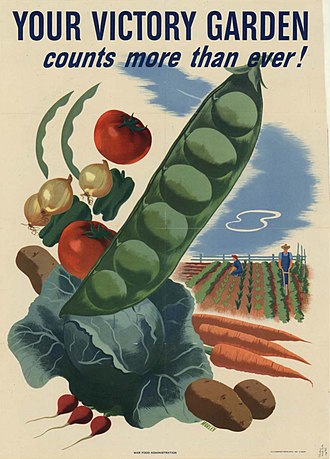Victory garden
Victory gardens, also known as war gardens or food gardens for defense, were private gardens planted at homes and public parks during World War I and World War II to reduce the pressure on the public food supply brought on by the war effort. Besides indirectly aiding the war effort, these gardens were also considered a civil "morale booster" in that gardeners could feel empowered by their contribution of labor and rewarded by the produce grown. This made victory gardens a part of daily life on the home front.
History
The concept of victory gardens originated during World War I, amidst food shortages and rationing. Governments encouraged citizens to cultivate fruits and vegetables in their backyards, vacant lots, and even city rooftops. They were immensely popular in countries such as the United States, Canada, the United Kingdom, and Australia. The movement continued into World War II, with the U.S. government issuing pamphlets instructing citizens on how to grow their own food. Famous slogans such as "Dig for Victory" and "Grow Your Own Food" became synonymous with the victory garden movement.
Impact
Victory gardens played a significant role in boosting food production during the wartime periods. In the United States, it was estimated that by 1944, there were 20 million victory gardens, and they produced roughly 40% of the vegetable produce being consumed nationally. This grassroots effort not only provided substantial amounts of food but also improved citizens' morale and solidarity during challenging times.
Post-War Period
After the wars, the popularity of victory gardens began to wane as people returned to their normal lives and the economy improved. However, the concept saw a resurgence in various forms over the years, especially during times of financial hardship or as part of the sustainable living movement. Today, the spirit of the victory garden lives on in community gardens and movements towards local food production and self-sufficiency.
Modern Relevance
In recent years, there has been a renewed interest in the concept of victory gardens as a response to climate change, food security concerns, and the desire for organic and locally grown produce. Schools, community groups, and individuals have taken up gardening not only as a means to produce food but also to foster community spirit, educate about agriculture and sustainability, and reconnect with the environment.
See Also
- Home front during World War I
- Home front during World War II
- Sustainable living
- Community gardening
- Organic farming
Transform your life with W8MD's budget GLP-1 injections from $125.
W8MD offers a medical weight loss program to lose weight in Philadelphia. Our physician-supervised medical weight loss provides:
- Most insurances accepted or discounted self-pay rates. We will obtain insurance prior authorizations if needed.
- Generic GLP1 weight loss injections from $125 for the starting dose.
- Also offer prescription weight loss medications including Phentermine, Qsymia, Diethylpropion, Contrave etc.
NYC weight loss doctor appointments
Start your NYC weight loss journey today at our NYC medical weight loss and Philadelphia medical weight loss clinics.
- Call 718-946-5500 to lose weight in NYC or for medical weight loss in Philadelphia 215-676-2334.
- Tags:NYC medical weight loss, Philadelphia lose weight Zepbound NYC, Budget GLP1 weight loss injections, Wegovy Philadelphia, Wegovy NYC, Philadelphia medical weight loss, Brookly weight loss and Wegovy NYC
|
WikiMD's Wellness Encyclopedia |
| Let Food Be Thy Medicine Medicine Thy Food - Hippocrates |
Medical Disclaimer: WikiMD is not a substitute for professional medical advice. The information on WikiMD is provided as an information resource only, may be incorrect, outdated or misleading, and is not to be used or relied on for any diagnostic or treatment purposes. Please consult your health care provider before making any healthcare decisions or for guidance about a specific medical condition. WikiMD expressly disclaims responsibility, and shall have no liability, for any damages, loss, injury, or liability whatsoever suffered as a result of your reliance on the information contained in this site. By visiting this site you agree to the foregoing terms and conditions, which may from time to time be changed or supplemented by WikiMD. If you do not agree to the foregoing terms and conditions, you should not enter or use this site. See full disclaimer.
Credits:Most images are courtesy of Wikimedia commons, and templates, categories Wikipedia, licensed under CC BY SA or similar.
Contributors: Prab R. Tumpati, MD






